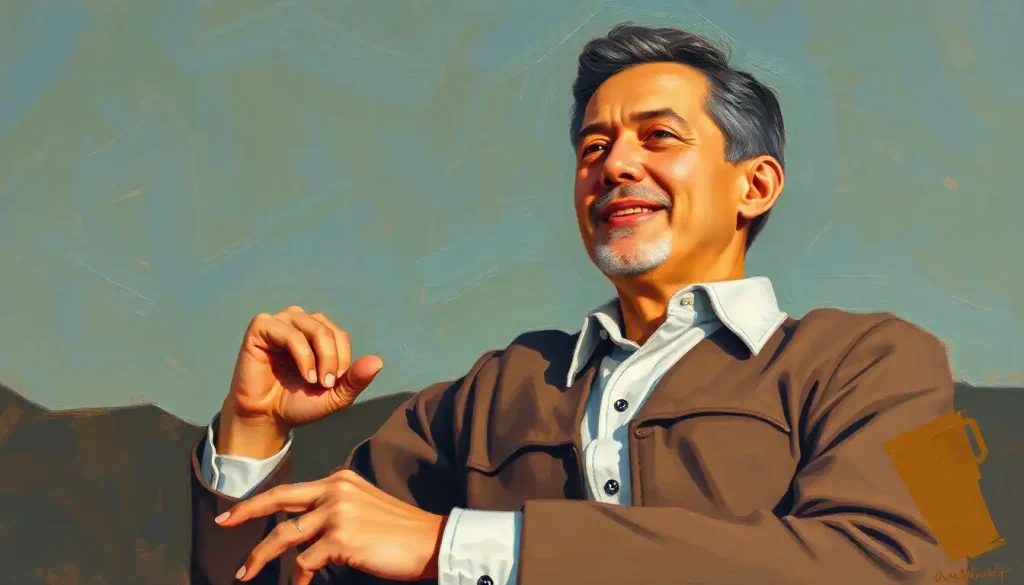Standing between you and financial freedom is a stack of life-changing books that could transform your twenty-something savings into a future fortune. The journey to financial literacy isn’t always smooth, but it’s a path worth taking. For young adults, the world of investing can seem like a complex maze. But fear not! With the right guides, you can navigate this labyrinth and emerge victorious, ready to conquer your financial goals.
Why is investing knowledge so crucial for long-term financial success? Well, imagine trying to build a house without knowing how to use a hammer or read blueprints. That’s what attempting to build wealth without understanding investing basics is like. It’s possible, but it’s going to be a lot harder and take a lot longer than it needs to.
Reading investing books offers a treasure trove of benefits. They provide you with time-tested strategies, insider knowledge, and the confidence to make informed decisions. Plus, they’re a lot cheaper than learning through costly mistakes in the real world. So, let’s dive into the world of investing literature and discover the books that could change your financial future.
Foundational Investing Books: Your Financial ABCs
Let’s start with the basics. These books are like the alphabet of investing – you need to know them before you can start forming words, let alone sentences or paragraphs.
First up is “Rich Dad Poor Dad” by Robert Kiyosaki. This book is like the cool uncle of investing literature. It challenges conventional wisdom about money and introduces concepts like assets and liabilities in a way that’s easy to grasp. Kiyosaki’s personal stories make the lessons stick, and you’ll find yourself looking at money in a whole new light.
Next, we have “The Intelligent Investor” by Benjamin Graham. Now, don’t let the title intimidate you. While it’s considered the bible of value investing, it’s not as dry as you might think. Graham’s concept of Mr. Market – a metaphor for the stock market’s mood swings – is both insightful and entertaining. This book is like a wise old grandfather, full of timeless advice that’s just as relevant today as it was when it was first published.
Rounding out our foundational trio is “A Random Walk Down Wall Street” by Burton Malkiel. This book is like the skeptical friend who questions everything – in the best way possible. Malkiel challenges the idea that anyone can consistently beat the market, introducing readers to the concept of efficient markets. It’s a great reality check for anyone dreaming of getting rich quick through stock picking.
These books form the bedrock of investing knowledge, providing a solid foundation for your financial education. They’re essential reads for anyone looking to understand the basics of investing and build long-term wealth.
Personal Finance and Wealth-Building: Beyond the Basics
Now that we’ve covered the basics, let’s move on to some books that focus on personal finance and wealth-building. These are the books that help you put theory into practice in your everyday life.
“The Total Money Makeover” by Dave Ramsey is like a no-nonsense personal trainer for your finances. Ramsey’s straightforward approach to getting out of debt and building wealth has helped millions of people. His “baby steps” method breaks down financial goals into manageable chunks, making the path to financial fitness seem less daunting.
Next up is “Your Money or Your Life” by Vicki Robin and Joe Dominguez. This book takes a more philosophical approach, encouraging readers to examine their relationship with money. It’s like a meditation retreat for your wallet, helping you align your spending with your values. The book’s concept of “enough” is particularly powerful in our consumerist society.
Rounding out this section is “The Millionaire Next Door” by Thomas J. Stanley and William D. Danko. This book is like the neighbor who seems ordinary but is secretly wealthy. It shatters the myth that millionaires all drive fancy cars and live in mansions. Instead, it reveals that many millionaires live below their means and prioritize financial independence over flashy lifestyles. It’s a great reality check for anyone who thinks wealth is all about appearances.
These books go beyond just investing theory and delve into the practical aspects of managing money and building wealth. They’re invaluable resources for young adults looking to establish good financial habits early in life.
Investment Strategy Books: Charting Your Course
Now that we’ve covered the basics and personal finance, let’s dive into some books that focus specifically on investment strategies. These books are like different maps to the same treasure – financial freedom.
“The Simple Path to Wealth” by JL Collins is like that friend who explains complex things in a way that just clicks. Collins advocates for a straightforward approach to investing, focusing on low-cost index funds. His “stock series” chapters break down investing concepts in a clear, engaging way that’s perfect for beginners.
Next, we have “The Little Book of Common Sense Investing” by John C. Bogle. Bogle, the founder of Vanguard, is like the wise sage of index investing. This book makes a compelling case for why low-cost index funds are the best choice for most investors. It’s a quick read, but packed with insights that could save you thousands in fees over your investing lifetime.
Completing our strategy trio is “The Bogleheads’ Guide to Investing” by Taylor Larimore, Mel Lindauer, and Michael LeBoeuf. This book is like a friendly mentor, guiding you through various aspects of investing. It covers everything from asset allocation to tax considerations, all while adhering to Bogle’s philosophy of low-cost, long-term investing.
These strategy books provide young adults with practical, actionable advice on how to invest their money wisely. They’re essential reads for anyone looking to develop a sound investment strategy. For more in-depth resources on investing strategies, check out this list of best books about money and investing.
Modern Investing Trends: Navigating the Digital Frontier
As we venture into the 21st century, new investment opportunities and technologies are emerging. These books help you navigate the brave new world of digital assets and cryptocurrencies.
“The Bitcoin Standard” by Saifedean Ammous is like a history professor who’s really excited about the future. Ammous provides a comprehensive look at the history of money and makes a case for why Bitcoin could be the next evolution. Whether you’re a crypto enthusiast or skeptic, this book offers valuable insights into the potential of digital currencies.
Next up is “The Crypto Trader” by Glen Goodman. Goodman is like that friend who got into Bitcoin early and actually made money. This book offers practical advice on trading cryptocurrencies, drawing from Goodman’s own experiences. It’s a great resource for anyone considering dipping their toes into the volatile world of crypto trading.
Rounding out our modern investing section is “The Age of Cryptocurrency” by Paul Vigna and Michael J. Casey. This book is like a well-researched documentary, providing a balanced look at the potential and pitfalls of cryptocurrencies. It covers the technology behind cryptocurrencies, their potential impact on global finance, and the regulatory challenges they face.
These books offer young adults a glimpse into the cutting edge of investing. While cryptocurrencies and digital assets are still relatively new and risky, understanding these trends is crucial for any modern investor.
Applying Your Knowledge: From Theory to Practice
Reading investing books is great, but the real magic happens when you apply that knowledge. Let’s look at how you can turn these pages of wisdom into real-world wealth.
Creating a personal investment plan is like plotting your course on a financial map. Start by defining your goals. Do you want to retire early? Buy a house? Travel the world? Your goals will shape your investment strategy. Next, assess your risk tolerance. Are you comfortable with the ups and downs of the stock market, or do you prefer more stable investments? Your risk tolerance will influence your asset allocation.
Implementing strategies learned from the books is where the rubber meets the road. For example, if you resonated with Bogle’s approach, you might start by opening an account with a low-cost broker and investing in broad-market index funds. If Kiyosaki’s ideas sparked your interest, you might look into real estate investing or starting a side business.
Remember, investing is not a “set it and forget it” activity. Continuous education and staying updated on market trends is crucial. Subscribe to financial newsletters, follow reputable financial news sources, and consider joining investment forums or clubs. This ongoing learning will help you adjust your strategy as needed and spot new opportunities.
The Road Ahead: Your Investment Journey Begins
As we wrap up our literary tour of investing wisdom, let’s recap some of the best investing books for young adults. “Rich Dad Poor Dad” challenges your preconceptions about money. “The Intelligent Investor” provides timeless wisdom on value investing. “The Simple Path to Wealth” offers a straightforward approach to long-term investing success. Each of these books, and the others we’ve discussed, offers unique insights that can shape your financial future.
The importance of continuous learning in personal finance cannot be overstated. The financial world is constantly evolving, with new investment vehicles, changing regulations, and shifting economic conditions. By cultivating a habit of lifelong learning, you’ll be better equipped to navigate these changes and make informed decisions.
To all the young adults out there, I can’t stress this enough: start investing early and wisely. Time is your greatest asset when it comes to investing. Thanks to the power of compound interest, even small amounts invested in your 20s can grow into substantial sums by retirement age. Don’t let fear or lack of knowledge hold you back. Use the wisdom from these books as a springboard to launch your investing journey.
Remember, every financial guru started as a beginner. Warren Buffett bought his first stock at 11, but he’s still learning and adapting his strategies decades later. Your journey to financial literacy and independence is just beginning, and these books are your trusty companions along the way.
So, what are you waiting for? Grab a book, start reading, and take that first step towards financial freedom. Your future self will thank you for the investment of time and effort you make today. Happy reading, and here’s to your financial success!
For those looking to expand their financial knowledge even further, consider exploring books on investing for kids to get an early start, or dive deeper into stock market investing books for more specialized knowledge. If you’re specifically interested in investing strategies for young people, there are resources tailored to your needs. Remember, the journey to financial literacy is ongoing, and there’s always more to learn!
References:
1. Kiyosaki, R. T. (1997). Rich Dad Poor Dad. Warner Books Ed.
2. Graham, B. (1949). The Intelligent Investor. Harper & Brothers.
3. Malkiel, B. G. (1973). A Random Walk Down Wall Street. W. W. Norton & Company.
4. Ramsey, D. (2003). The Total Money Makeover. Thomas Nelson.
5. Robin, V., & Dominguez, J. (1992). Your Money or Your Life. Penguin Books.
6. Stanley, T. J., & Danko, W. D. (1996). The Millionaire Next Door. Longstreet Press.
7. Collins, J. L. (2016). The Simple Path to Wealth. CreateSpace Independent Publishing Platform.
8. Bogle, J. C. (2007). The Little Book of Common Sense Investing. John Wiley & Sons.
9. Larimore, T., Lindauer, M., & LeBoeuf, M. (2006). The Bogleheads’ Guide to Investing. John Wiley & Sons.
10. Ammous, S. (2018). The Bitcoin Standard. Wiley.
11. Goodman, G. (2019). The Crypto Trader. Harriman House.
12. Vigna, P., & Casey, M. J. (2015). The Age of Cryptocurrency. St. Martin’s Press.












Would you like to add any comments? (optional)